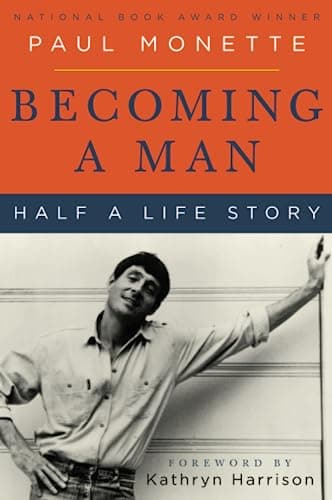
Book Review Summary: Becoming a Man
Introduction
"Becoming a Man" by Paul Monette is a powerful and moving memoir that explores the author's journey of self-discovery and acceptance as a gay man in a society that often shuns and stigmatizes homosexuality. Through his candid and emotionally charged prose, Monette takes readers on a journey through his formative years, his struggles with self-acceptance, and his eventual coming out. This book offers a raw and unflinching look at the challenges faced by LGBTQ+ individuals and serves as a testament to the resilience and strength of the human spirit.
About Paul Monette
Paul Monette, the author of "Becoming a Man," was born in Lawrence, Massachusetts, in 1945. He attended prestigious schools in New England, including Phillips Andover Academy and Yale University, where he received his B.A. in 1967. After coming out in his late twenties, Monette met Roger Horwitz, who became his lover for over twenty years. Monette's life changed dramatically when Horwitz was diagnosed with AIDS in the early 1980s, and he wrote extensively about their battles with the disease and the impact it had on their relationship. Monette's works, including "Becoming a Man," have been widely acclaimed for their honesty, wit, and humanity.
Analysis of Views
- Coming-of-Age Story: Many readers praised "Becoming a Man" for its coming-of-age theme. The book provides a raw and honest account of the challenges faced by young gay men as they navigate their identity and come to terms with their sexuality. Readers appreciated the way Monette depicted the complexities of growing up gay in a society that often rejects and stigmatizes homosexuality.
- Honesty and Emotion: Monette's writing style was widely praised for its honesty and emotional depth. Readers found themselves deeply invested in the author's journey and appreciated the way he conveyed his emotions through vivid descriptions and poignant reflections. The book's emotional resonance made it a powerful read for many readers.
- Representation of Gay Experience: "Becoming a Man" was also commended for its representation of the gay experience. The book provided readers with a unique perspective on the challenges faced by gay men in society, including the struggle to find acceptance and the impact of societal stigma. Readers appreciated the way Monette portrayed the complexities of gay identity and the importance of self-acceptance.
- Literary Merit: Many readers highlighted the literary merit of "Becoming a Man." The book's prose was praised for its poetic quality and its ability to convey deep emotions through vivid imagery and metaphorical language. Monette's writing style was described as evocative, lyrical, and deeply moving, making it a standout memoir in the genre.
- Personal Growth: The book was also appreciated for its exploration of personal growth and self-discovery. Readers found inspiration in Monette's journey as he navigated his own struggles with self-acceptance and learned to embrace his true identity. The book's message of resilience and self-love resonated with many readers who were seeking empowerment and inspiration.
Reasons for Recommendation
- Honesty and Emotion: The honesty and emotional depth of Paul Monette's writing make "Becoming a Man" a compelling read. The book's raw portrayal of the author's struggles with self-acceptance and societal stigma resonates deeply with readers who appreciate authenticity in literature.
- Representation of Gay Experience: "Becoming a Man" provides readers with an insightful look into the challenges faced by gay men in society. The book's portrayal of gay identity and the importance of self-acceptance makes it a valuable addition to LGBTQ+ literature.
- Literary Merit: The literary merit of "Becoming a Man" is undeniable. Monette's poetic prose and evocative storytelling make it a standout memoir that transcends its genre. Readers who appreciate literary excellence will find much to admire in this book.
- Personal Growth: The book's exploration of personal growth and self-discovery offers readers valuable insights into their own journeys of self-acceptance. The message of resilience and self-love found in "Becoming a Man" can serve as an inspiration to readers seeking empowerment and motivation.
Reasons for Not Recommending
- Sensitivity to Content: Some readers may find the explicit sexual content in "Becoming a Man" off-putting or uncomfortable to read. The book includes detailed descriptions of sexual encounters, which may not be suitable for all readers. Those who prefer more traditional or conservative literature may not enjoy this aspect of the book.
- Emotional Depth: While many readers appreciate the emotional depth and honesty of Paul Monette's writing, some may find it overwhelming or emotionally intense. The book's exploration of pain, trauma, and societal stigma can be emotionally challenging for some readers, especially those who are sensitive to such themes.
- Limited Scope: Some readers may feel that "Becoming a Man" has a limited scope compared to other memoirs in the genre. While the book provides an intimate look into Monette's personal journey, it may not offer a comprehensive exploration of the broader LGBTQ+ experience or address all aspects of queer identity. Readers seeking a more comprehensive exploration may find this aspect lacking in comparison to other memoirs.
Conclusion
"Becoming a Man" by Paul Monette is a powerful memoir that offers readers an intimate glimpse into the author's journey of self-discovery as a gay man in a society that often rejects homosexuality. Through its candid prose, emotional depth, representation of gay experience, literary merit, and exploration of personal growth, the book resonates deeply with readers who appreciate authenticity, representation, and inspiration. However, some readers may find the explicit sexual content off-putting or prefer more traditional literature without such explicit descriptions. Overall, "Becoming a Man" is a thought-provoking and emotionally impactful memoir that sheds light on the challenges faced by LGBTQ+ individuals and serves as a testament to resilience and self-love.